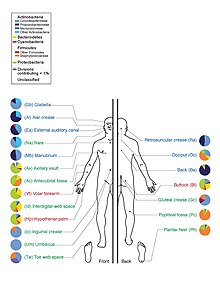
Back نبيت جرثومي جلدي Arabic Hautflora German Flora de la piel Spanish Larruazaleko flora Basque Microbiote cutané humain French Flora da pel Galician کھل جیون PNB Микрофлора кожи Russian Cilt mikrobiyotası Turkish 皮肤菌群 Chinese

Skin flora, also called skin microbiota, refers to microbiota (communities of microorganisms) that reside on the skin, typically human skin.
Many of them are bacteria of which there are around 1,000 species upon human skin from nineteen phyla.[1][2] Most are found in the superficial layers of the epidermis and the upper parts of hair follicles.
Skin flora is usually non-pathogenic, and either commensal (are not harmful to their host) or mutualistic (offer a benefit). The benefits bacteria can offer include preventing transient pathogenic organisms from colonizing the skin surface, either by competing for nutrients, secreting chemicals against them, or stimulating the skin's immune system.[3] However, resident microbes can cause skin diseases and enter the blood system, creating life-threatening diseases, particularly in immunosuppressed people.[3]
A major non-human skin flora is Batrachochytrium dendrobatidis, a chytrid and non-hyphal zoosporic fungus that causes chytridiomycosis, an infectious disease thought to be responsible for the decline in amphibian populations.[4]
- ^ Grice EA, Kong HH, Conlan S (2009). "Topographical and Temporal Diversity of the Human Skin Microbiome". Science. 324 (5931): 1190–92. Bibcode:2009Sci...324.1190G. doi:10.1126/science.1171700. PMC 2805064. PMID 19478181.
- ^ "Your Body Is a Wonderland ... of Bacteria". www.science.org. 28 May 2009. Retrieved 2023-01-02.
- ^ a b Cogen AL, Nizet V, Gallo RL (2008). "Skin microbiota: a source of disease or defence?". Br J Dermatol. 158 (3): 442–55. doi:10.1111/j.1365-2133.2008.08437.x. PMC 2746716. PMID 18275522.
- ^ Voyles, Jamie; Young, Sam; Berger, Lee; Campbell, Craig; Voyles, Wyatt F.; Dinudom, Anuwat; Cook, David; Webb, Rebecca; Alford, Ross A.; Skerratt, Lee F.; Speare, Rick (2009-10-23). "Pathogenesis of Chytridiomycosis, a Cause of Catastrophic Amphibian Declines". Science. 326 (5952): 582–585. Bibcode:2009Sci...326..582V. doi:10.1126/science.1176765. ISSN 0036-8075. PMID 19900897. S2CID 52850132.
© MMXXIII Rich X Search. We shall prevail. All rights reserved. Rich X Search